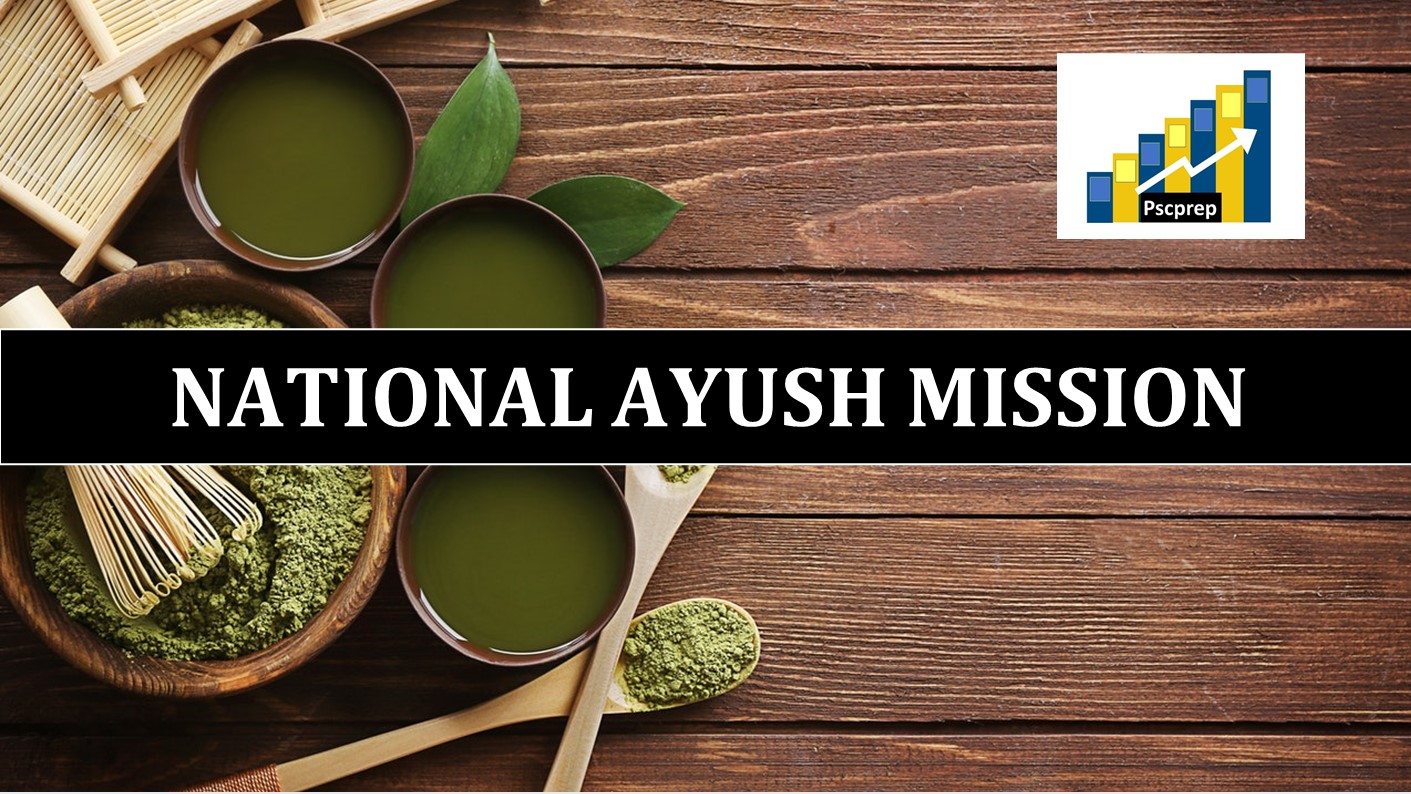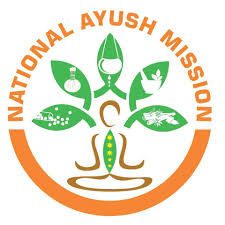National AYUSH Mission (NAM): Overview
Department of AYUSH, Ministry of Health and Family Welfare launched the National Ayush Mission (NAM), a centrally sponsored scheme in 2014. It was launched with the basic objective of promoting Ayurveda, Yoga, Siddha & Unani and Homoeopathy (AYUSH) medical system through cost effective services, strengthening of educational systems, facilitate the enforcement of quality control of Ayurveda, Siddha and Unani & Homoeopathy (ASU &H) drugs and sustainable availability of ASU & H raw-materials. It envisages flexibility of implementation of the programmes which will lead to substantial participation of the State Governments/UT.

National AYUSH Mission (NAM): Funding
Under Centrally Sponsored Scheme of National AYUSH Mission (NAM) financial assistance is being provided to the States/UTs for promotion of AYUSH system as per the State Annual Action Plan (SAAP) received from the States/UTs.
National AYUSH Mission (NAM): Objectives
The main objective of AYUSH services is to enhance coverage of health care system through cost effective AYUSH Services by focusing on core competency areas of AYUSH through upgrading AYUSH Hospitals and Dispensaries, co-location of AYUSH facilities at Primary Health Centres (PHCs), Community Health Centres (CHCs), District Hospitals (DHs) and Setting up of upto 50 bedded Integrated AYUSH Hospitals.
National AYUSH Mission (NAM): Components
The National AYUSH Mission (NAM) inter-alia makes provision for the following:
- Co-location of AYUSH facilities at PHCs, CHCs and DHs.
- Upgradation of exclusive / standalone Government AYUSH Hospitals (other than PHCs / CHCs/ DHs)
- Upgradation of Government / Panchayat / Government aided AYUSH Dispensaries
- Setting up of upto 50 bedded integrated AYUSH Hospitals
- Supply of essential drugs to AYUSH Hospitals and Dispensaries
- Public Health Outreach activity
- Behaviour Change Communication (BCC)
- Mobility support
- AYUSH Gram
- School Health Programme through AYUSH

National AYUSH Mission (NAM): Details of initiatives
Ministry of AYUSH is taking various initiatives in promotion and integration of Indian AYUSH System with modern system to increase their acceptability as scientific and reliable alternative system of medicine. The highlights of such initiatives have been the following:
- Ministry of AYUSH under Centrally Sponsored Scheme of National AYUSH Mission (NAM) co-locates AYUSH facilities at Primary Health Centres (PHCs), Community Health Centres (CHCs) and District Hospitals (DHs), thus enabling choice to the patients for different systems of medicine.
- Ministry of AYUSH along with Directorate General of Health Services (DGHS) is implementing NPCDCS (National Programme for Prevention and Control of Cancer, Diabetes, Cardiovascular Diseases and Stroke) for health promotion, prevention and management of Non-communicable diseases or Lifestyle related disorders through its three research organizations, namely, Central Council for Research in Ayurvedic Sciences (CCRAS), Central Council for Research in Unani Medicine (CCRUM) and Central Council for Research in Homoeopathy (CCRH) in districts namely Bhilwara (Rajasthan), Surendranagar (Gujarat), Gaya (Bihar), Darjeeling (West Bengal), Krishna (Andhra Pradesh), Sambalpur (Odisha) Nasik (Maharashtra) and Lakhimpur Kheri (UP).
- It has been decided that 10% of the Sub- centres are to be upgraded as Health and Wellness Centres (HWCs) under Ayushman Bharat which will be developed by the Ministry of AYUSH to provide comprehensive Health care to the needy community. The Ministry of AYUSH has to develop a total number of 12,500 HWCs in 3 years, out of which 4200 will be operationalized during current year.
- CCRH has developed a public health program on ‘Homoeopathy for Healthy Child’ which has been integrated with Rashtriya Bal Swasthya Karyakram (RBSK).
- Central Council for Research in Siddha (CCRS) conducts special OPD for non-communicable diseases and geriatric population. Many of the patients are on conventional treatment and with the help of Siddha intervention the HbA1c levels have been significantly reduced in diabetic patients and the quality of life of the patients has been improved. Nilavembu Kudineer a Siddha polyherbal formulation has been incorporated into integrative medicine strategy for the prevention and management of Dengue and Chikungunya.
- Morarji Desai National Institute of Yoga (MDNIY), an autonomous organization under Ministry of AYUSH has established 19 Preventive Health Care Units of Yoga in CGHS Wellness Centres in Delhi and NCR. Regular Yoga training programmes are being held in these Units. MDNIY has established 4 Yoga Therapy Centres in Delhi with the basic objective of mainstreaming Yoga in the existing health care system. These Centres are providing Yoga consultation and imparts Yoga Training and Therapy to the aspirants/patients in the Hospitals.
- Health is a state subject and the concerned state Government adopt various measures to improve the Government health delivery system, including AYUSH Systems of Healthcare. At the Central level, the Ministry of AYUSH also takes various initiatives to achieve this goal, mainly through interventions in areas like AYUSH education, AYUSH Research, establishing and running national level institutes, setting guidelines for drug regulation, setting benchmarks for AYUSH digitisation and forgoing international collaboration in relevant activities.
- The Ministry of AYUSH regularly observes days dedicated to AYUSH Systems of Medicine Viz. International Day of Yoga, Ayurveda Day, Unani Day, Siddha Day, Naturopathy Day, Homoeopathy Day etc. to create awareness about the benefits of the respective AYUSH system of medicine including natural medical systems.
- A Central Sector Scheme for Promotion of Information Education and Communication (IEC) in AYUSH has been devised by the Ministry of AYUSH for this purpose. Under this Scheme, the Ministry of AYUSH takes up initiatives to create awareness about and to promote AYUSH systems of medicine including natural medical systems. These initiatives include organizing Arogya Fairs, Melas, Conferences, Exhibitions, Seminars, Workshops, Symposium, Yoga Fests and Ayurveda Parvs. The IEC Scheme also supports undertaking publicity campaigns through electronic media, print media and social media amongst the citizens in the country.
- Ministry of AYUSH has established five Research Councils namely CCRAS, CCRUM, CCRS, CCRH & CCRYN for Research in Ayurveda, Unani, Siddha, Homoeopathy, Yoga & Naturopathy respectively. These research councils apart from engaging in clinical/ field research also undertake the following activities: –
- Running Mobile health programme catering to backward regions and SC/ST communities
- Undertaking health awareness campaigns.
- Piloting Innovations like telemedicine with the help of common service centres.
- Ministry of AYUSH has already established advanced research institutes in Indian medical systems through Research Councils.
- Central Council for Research in Homoeopathy (CCRH) has 21 Research Centres in different States/UTs for advance research in Homoeopathy.
- Central Council for Research in Ayurvedic Sciences (CCRAS) is carrying out its research activities through its 30 Institutes/Centres/Units located all over India and also through collaborative studies with various Universities, Hospitals and Institutes. The research activities of the Council include Medicinal Plant Research (Medico-Ethno Botanical Survey, Pharmacognosy and Tissue Culture), Drug Standardization, Pharmacological Research, Clinical Research, Literary Research & Documentation and Tribal Health Care Research Programme.
- Central Council in Research in Siddha (CCRS) had initiated steps to establish advanced research in Siddha medical systems through IMR and EMR projects. Clinical research, Epidemiological research, Drug research, Literary and fundamental research, and Medicinal plants research are being carried out in these units. Totally there are 25 ongoing IMR projects and 8 completed IMR projects of CCRS.
- Central Council for Research in Unani Medicines (CCRUM) has also carried out Advance Research on various diseases in collaboration with other renowned academic/scientific institutes.
- CCRUM is also authenticating raw drugs as well as compound formulations by implementing Pharmacognostical methods viz., Macroscopy, Microscopy and Powder Microscopy; Physico-chemical methods and instrumental such as TLC fingerprint.

National AYUSH Mission (NAM): AYUSH GRID Project
Ministry of AYUSH has conceptualized AYUSH GRID Project for digitizing AYUSH healthcare delivery at all levels. The details are as under:
National AYUSH Mission (NAM): AYUSH GRID Project: Overview
The AYUSH Grid Project is the proposed IT backbone for the entire AYUSH sector covering the healthcare systems Ayurveda, Yoga & Naturopathy, Unani, Siddha, Sowa Rigpa and Homoeopathy. AYUSH Grid is envisaged as an omnibus digital eco- system that would lead to all round development of the AYUSH sector in fields of healthcare delivery at all levels, research, education, schemes and various health programs.
National AYUSH Mission (NAM): AYUSH GRID Project: Objectives
To develop a network of People, Knowledge and Technology for radical, sustainable and wholesome transformation of AYUSH sector, and play a pivotal role in taking care of holistic health care needs (i.e. curative, preventive and promotive health) and socio- economic wellbeing of Indian citizens and further extending the benefits to entire world population.
To create an organic and dynamic information and communication technology (ICT) powered network interconnecting all streams of AYUSH in their key functional areas viz. health care delivery, capacity building, research & development, AYUSH drug regulation and education. This will be beneficial for all stakeholders of AYUSH and also helpful for effective governance. Strategies for development will be in sync with the national and international policies and health care needs.
National AYUSH Mission (NAM): AYUSH GRID Project: Components
The main components of AYUSH GRID Project are as under:
- Health Services
- Education
- Research
- Central Sector and Centrally Sponsored Schemes
- Training
- Citizen Centric Services
- Drug Licencing Portal
- Media Outreach
National AYUSH Mission (NAM): AYUSH GRID Project: Other Initiatives
Ministry of AYUSH has taken up various pilot projects like AYUSH Hospital Management Information System (A-HMIS), Yoga locator application, Telemedicine, Yoga Portal, A-HMIS trainings, IT course for AYUSH Professionals, etc. which shall be merged into AYUSH Grid Project after completion of pilot period.
Ministry of AYUSH has also signed Memorandum of Understanding (MoU) with Ministry of Electronics and Information Technology (MeitY) for technical help in AYUSH Grid Project and accordingly, Ministry has handed over projects of Dashboard, GIS facility for various functionalities of AYUSH and AYUSH Information Hub to National e- Governance Division(NeGD)/ Bhaskaracharya Institute for Space Applications and Geo-Informatics(BISAG).

National AYUSH Mission (NAM): Future
Union Cabinet has approved continuation of Centrally Sponsored Scheme of National AYUSH Mission (NAM) on 15.12.2017 from 01.04.2017 to 31.03.2020. Further, in the recent past, there is a paradigm shift in the approach from disease management towards achieving wellness. The AYUSH systems advocate holistic wellness approach aiming at prevention of diseases and promotion of health and wellbeing. A decision was taken on 30th Jan, 2019 that at least 12,500 Health and Wellness Centres (HWCs) under Ayushman Bharat will be upgraded by the Ministry of AYUSH. The Union Cabinet during its meeting on 20th March, 2020 has approved the proposal to operationalise these 12,500 AYUSH HWCs through States/UTs in Centrally Sponsored Scheme mode and under the broad umbrella of National AYUSH Mission (NAM) in a phased manner by 2023-24.

Read more about National Ayush Mission: https://namayush.gov.in/content/ayush-services-0
Read more about National Ayush Mission Objectives: https://namayush.gov.in/content/objectives
Read more about:Samagra Shiksha Scheme
Read more about: Ayushman Bharat : Pradhan Mantri Jan Arogya Yojana (PMJAY)
Read more about: Atal Innovation Mission (AIM) for UPSC
Read more about: Atal Bhujal Yojana for UPSC/PCS
Read more about: Important Government Schemes